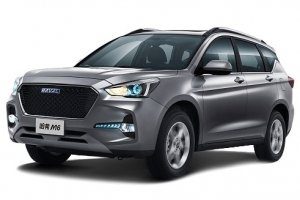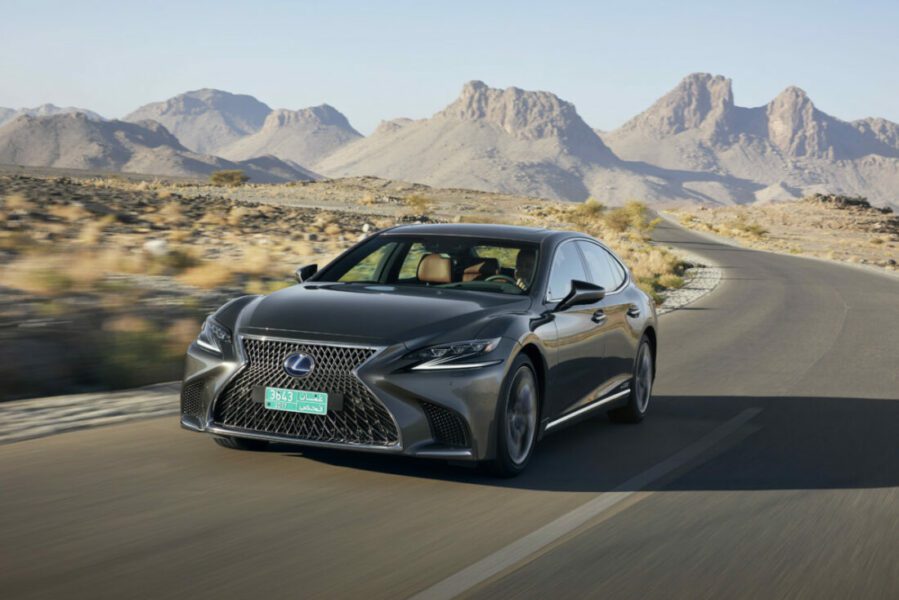
Test: Lexus LS 500h Luxury
Content
Since there is not much space, let's keep it short: yes. But the final score depends largely on experience and expectations. What does this mean? For those who are used to the German concept of prestigious limousines, this will not suit. The LS 500h (partly by design and partly because it's not a European car) is different. Even to its fifth generation, and this, of course, 30 years after the appearance of the first, Lexus developers took it no less seriously than the first. Vice versa.
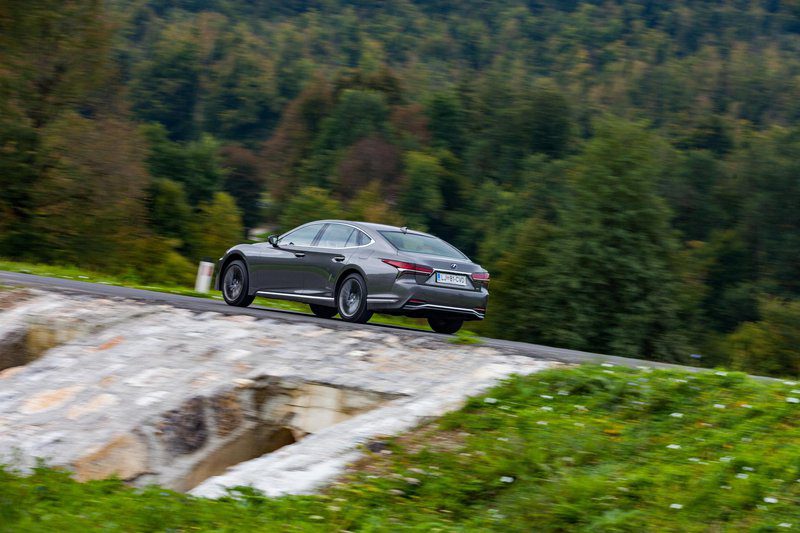
Therefore, for example, the fifth generation is the law of design, the opposite of a boring, general beginning. The shape, which shares similarities with the LC coupe, is truly extroverted - especially the mask, which gives the car a truly unique look. The LS is short and sporty, but at first glance it hides its external length well - at first glance, it's hard to believe that its length is 5,23 meters. Do you find it often? Possibly, but because Lexus decided that the LS, built on Toyota's new global platform for luxury rear-wheel drive vehicles (but of course, like the test LS 500h, is also available with all-wheel drive), is only available in a long wheelbase from this generation. spacious enough inside. Indeed: by moving the front passenger seat (with the help of the infotainment system, which will be discussed later) and setting the rear seat (in the same way) to the fully reclined position, there is enough space at the rear on the right. for a comfortable, almost reclined rest of a passenger with a height of 1,9 meters. And if they sit usually tall in the front (again: also 1,9 meters; although the LS was formed (also) in Japan, where such a height is not quite normal, it is normal for the LS), there is still enough space in it. backrest for the longest journeys. And since the seats offer not only cooling and heating, but also massage (it should be noted that such an LS is a four-seater), even very long distances can be extremely comfortable and enjoyable - especially because they do not skimp on soundproofing. , and the chassis is tuned purely for comfort.
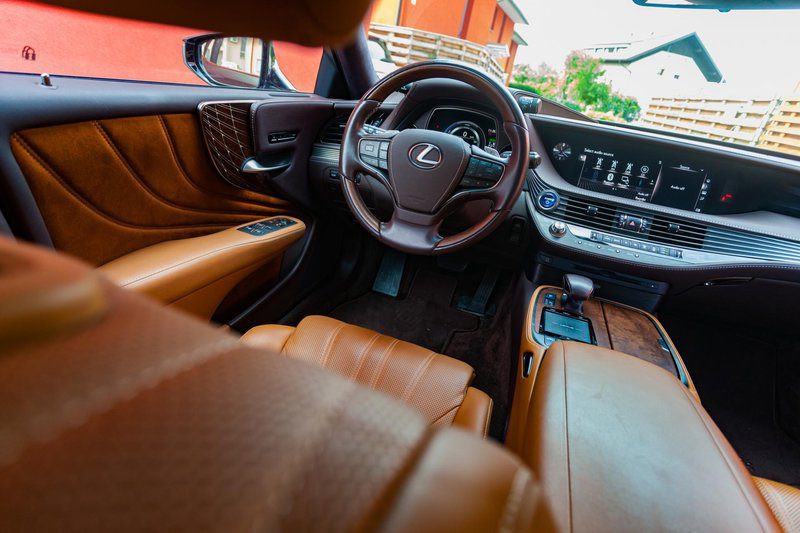
And if the chassis is extremely comfortable (and therefore not very sporty, unlike any European competitor, and this is quite understandable and acceptable), the same cannot be said about the sound of the engine (which enters the cabin).
3,5-liter V6 with Atkinson cycle and 132-kilowatt electric motor, which together provide 359 "horsepower" of power to the system, but when the driver requests it from the car, it sounds normal in normal driving with not very exciting (to put it mildly) passing turns, which is not given to a car of this class. The electronics or audio system makes the sporty sound more sporty in driving mode, but let's be realistic: which driver will change the driving mode with each acceleration. It would be better if the LS were even quieter (though, with the exception of sharp accelerations, it is really very, very quiet).
It's the same with the transmission: to meet the demands of high speeds while maintaining the best hybrid performance, Lexus engineers added a classic four-speed automatic transmission to the well-known electronic CVT continuously variable transmission - and this, unfortunately, results in too much jolt, wobble. and indecision to be suitable for such a machine. Those accustomed to Lexus' hybrid drive for its smoothness and stealth will be especially disappointed. Here you can find another solution from Lexus (perhaps with a classic continuously variable transmission instead of a torque converter automatic) or at least sharpen the automatic.
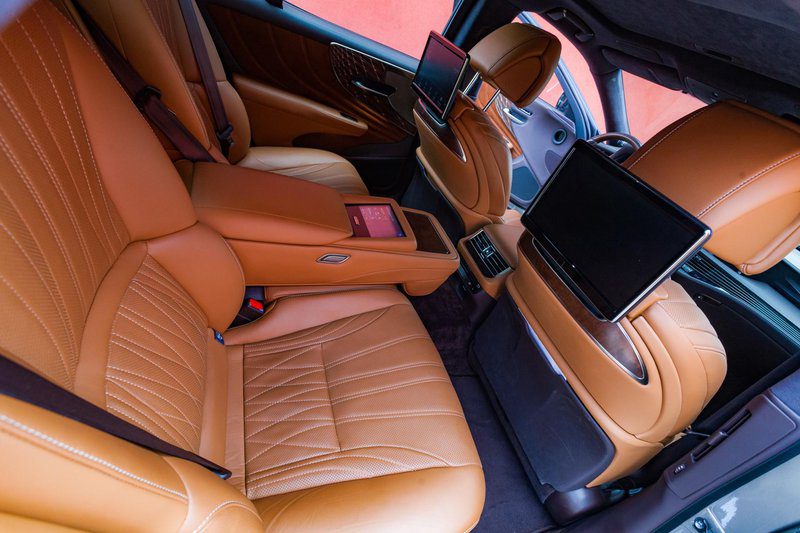
The LS500h can only run on electricity at speeds up to 140 kilometers per hour (this means that the petrol engine shuts down at this speed under low load, otherwise it can only accelerate to the classic 50 kilometers per hour on electricity), which is also for its lithium-ion battery, which replaced the NiMH battery from its predecessor, the LS600h. It's smaller, lighter, but of course just as powerful.
There is no shortage of performance in the LS 500h (as evidenced by acceleration in 5,4 seconds to 100 kilometers per hour), at the same time it is not diesel (which is a highly desirable feature in itself), but has low diesel consumption. : on our standard lap satisfied with only 7,2 liters of gasoline per 100 kilometers. Big!
If you attribute the plus to the expense and comfort and the minus to the gearbox, the infotainment system deserves something else. Not his selectors (although they may be more intuitive, but above all, more beautiful graphics), but his controls. The LS doesn't know how to touch the touchscreen, and the infotainment system only needs to be operated via the touchpad, which means a serious lack of feedback, constant screen viewing and a bunch of missed options. How such a system could ever get into mass production will probably forever remain a mystery to us. This might be even better, but Lexus will definitely have to make a huge flight forward in this area.
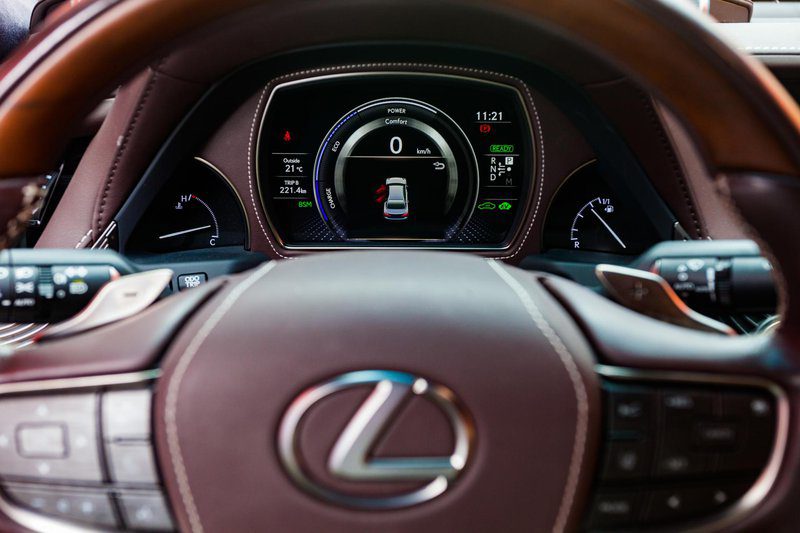
Of course, the new platform also means (with the exception of the infotainment system) advances in digital systems. The safety system provides not only automatic braking if a pedestrian walks in front of the car, but also steering support (which, however, does not know how to keep the middle of the lane well, but rather winds between curbs). The LS has also got matrix LED headlights, but it can also automatically warn the driver or brake if it detects the possibility of a collision with cross-traffic at an intersection, as well as when parking and parking.
Thus, the Lexus LS remains something special in its class - and with all the good and bad characteristics that such a label carries. We have no doubt that he will find his circle of (also very loyal) customers, but if Lexus thought about some details better and finalized them, it would be great, and above all (driving and philosophy), not only different, but also much more. more serious competition with European prestige.
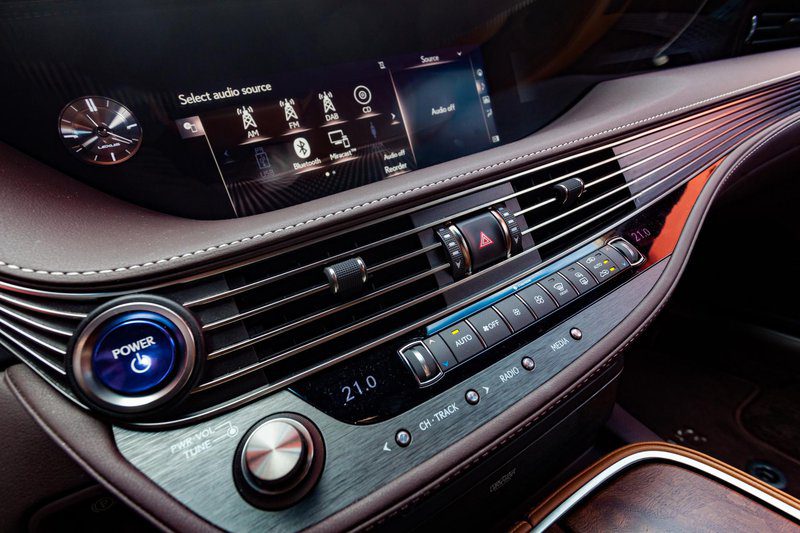
Lexus LS 500h Lux
Basic data
| Sales: | Toyota Adria Ltd. |
|---|---|
| Test model cost: | 154.600 € |
| Base model price with discounts: | 150.400 € |
| Test model price discount: | 154.600 € |
| Power: | 246kW (359 KM) |
| Acceleration (0-100 km / h): | 5,5 with |
| Maximum speed: | 250 km / h |
| Guarantee: | General 5-year unlimited mileage warranty, 10-year hybrid battery warranty |
| Systematic review | 15.000 km |
Cost (up to 100.000 km or five years)
| Regular services, works, materials: | 2.400 € |
|---|---|
| Fuel: | 9.670 € |
| Tires (1) | 1.828 € |
| Loss of value (within 5 years): | 60.438 € |
| Compulsory insurance: | 5.495 € |
| CASCO INSURANCE (+ B, K), AO, AO + | 12.753 ( |
| Calculate the cost of auto insurance | |
| Buy up | € 92.584 0,93 (km cost: XNUMX €) |
Technical information
| engine: | V6 – 4-stroke – in-line – petrol – longitudinally front mounted – bore and stroke 94×83 mm – displacement 3.456 cm3 – compression 13:1 – maximum power 220 kW (299 hp) at 6.600 rpm – average piston speed at maximum power 20,7 m/s – specific power 63,7 kW/l (86,6 hp/l) – maximum torque 350 Nm at 5.100 rpm – 2 camshafts in head (belt timing) - 4 valves per cylinder - direct fuel injection |
|---|---|
| Battery: | Li-ion, np kWh |
| Energy transfer: | engine drives all four wheels - e-CVT gearbox + 4-speed automatic transmission - np ratio - np differential - 8,5 J × 20 rims - 245/45 R 20 Y tires, rolling range 2,20 m |
| Capacity: | top speed 250 km/h - acceleration 0-100 km/h 5,5 s - average combined fuel consumption (ECE) 7,1 l/100 km, CO2 emissions np g/km - electric range (ECE) np |
| Transportation and suspension: | sedan - 5 doors, 4 seats - self-supporting body - front single suspension, coil springs, three-spoke wishbones, stabilizer bar - rear multi-link axle, coil springs, stabilizer bar - front disc brakes (forced cooling), rear disc brakes, ABS, rear electric parking brake wheels (switching between seats) - rack and pinion steering wheel, electric power steering, 2,6 turns between extreme points |
| Mass: | empty vehicle 2.250 kg - permissible total weight 2.800 kg - permissible trailer weight with brake: np, without brake: np - permissible roof load: np |
| External dimensions: | length 5.235 mm - width 1.900 mm, with mirrors 2.160 mm - height 1.460 mm - wheelbase 3.125 mm - front track 1.630 mm - rear 1.635 mm - driving radius 12 m |
| Inner dimensions: | longitudinal front 890-1.140 mm, rear 730-980 mm - front width 1.590 mm, rear 1.570 mm - head height front 890-950 mm, rear 900 mm - front seat length 490-580 mm, rear seat 490 mm - steering wheel diameter 370 mm - fuel tank 82 l. |
| Box: | 430 |
Our measurements
| T = 25 ° C / p = 1.028 mbar / rel. vl. = 55% / Tires: Bridgestone Turanza T005 245/45 R 20 Y / Odometer status: 30.460 km | |
| Acceleration 0-100km: | 6,5s |
|---|---|
| 402m from the city: | 14,7 years ( 155 km / h) |
| Maximum speed: | 250km / h |
| Fuel consumption according to the standard scheme: | 7,2 l / 100km |
| Braking distance at 130 km / h: | 69,0m |
| Braking distance at 100 km / h: | 40,7m |
| AM table: | 40m |
| Noise at 90 km / h | 58dB |
| Noise at 130 km / h | 60dB |
| Test errors: | Unmistakable |
Overall rating (502/600)
The LS remains (in a new, improved version) what it has always been: an interesting (and good) alternative to German premium sedans for those who are not afraid to be different.
Cab and trunk (92/110)
On the one hand, there is really a lot of space in the rear of the cabin, and on the other hand, the trunk is much less useful (and large) than we would like.
Comfort (94
/ 115)The seats are widely adjustable and very comfortable, even (or even above all) the rear seats, including the massage ones. The score dropped dramatically due to the poorly controlled infotainment system.
Transmission (70
/ 80)The seats are widely adjustable and very comfortable, even (or even especially) in the back - including the massage ones. Points have been greatly reduced due to a poorly managed infotainment system. The hybrid transmission is economical and powerful enough, minus we attributed to insufficiently modified automation.
Driving performance (88
/ 100)The LS is not an athlete, but at home it is very comfortable and clean enough even in corners. Good compromise
Security (101/115)
The list of protective equipment is rich, but not everything works as you expect.
Economy and environment (57
/ 80)Of course, such an LS is economical and environmentally friendly, but the warranty conditions are below our expectations.
Driving pleasure: 3/5
If we only counted the pleasure of the quiet cockpit, massaging seats and comfortable chassis, we'd give it a five. But since we also want cars that are dynamic for the driver, he gets a 3 - even though that's not his intention.
We praise and reproach
appearance
consumption
seats and comfort
infotainment system
infotainment system
and again the infotainment system
